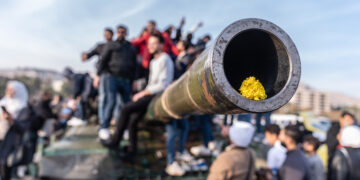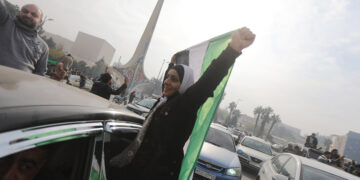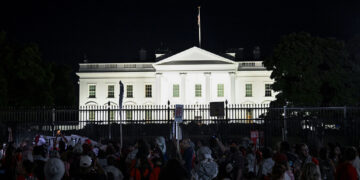Group will ensure Khashoggi Ban is enforced against foreign agents intimidating dissidents overseas
(Washington D.C., August 2, 2021) – The fight against global authoritarianism gained momentum on July 28 when representatives from 40 advocacy organizations held their first Working Group meeting to implement the Khashoggi Ban, a State Department policy to bar foreign government officials engaged in extraterritorial counter-dissident activities from traveling to the United States. individuals linked to crackdowns on political dissidents abroad.
Democracy for the Arab World Now (DAWN), in coordination with partners and U.S. government officials, convened the meeting to launch the "Khashoggi Ban Working Group"—a civil society coalition that will work in coordination with the U.S. State Department to develop the guidelines for implementation of the Khashoggi Ban.
"The Khashoggi Ban will make it harder for repressive regimes to maintain their chokeholds on civil society and opposition voices, at home or abroad," said Raed Jarrar, advocacy director at DAWN. "For too long, abusive government agents have not only avoided repercussions and accountability at home but been welcomed on U.S. soil. We will be working to make this stop."
Secretary of State Antony Blinken announced the Khashoggi Ban on February 26— the same day the Office of the Director of National Intelligence (ODNI) released its report concluding that Saudi Crown Prince Mohammed Bin Salman (MBS) approved the operation that led to the murder of late Saudi journalist and DAWN founder, Jamal Khashoggi.
"The Khashoggi Ban Working Group will ensure we use every opportunity we have to hold abusive government agents accountable for their roles in repression and violence against people who criticize them."
- Raed Jarrar
The ban was intended as a measure of accountability for Khashoggi's killing and the Saudi agents responsible, including MBS. It applies to individuals who, acting on behalf of a foreign government, are believed to have been directly engaged in serious, extraterritorial counter-dissident activities, including those that suppress, harass, surveil, threaten, or harm journalists, activists, or other persons perceived to be dissidents for their work. Targeting of immediate family members of perceived dissidents located outside of the country of the foreign government also falls within the bounds of the ban.
Under its mandate, the Khashoggi Ban Working Group will bring civil society organizations together with State Department officials to submit the names of individuals for consideration for the ban and discuss its implementation. The Working Group will start by developing mechanisms and forms to facilitate the submission of Khashoggi Ban candidates, including standardizing the process for the nongovernmental organizations and government officials involved. State Department officials explained the legal definition of the ban and current implementation mechanisms at the July 28th meeting. The Working Group will also offer information, support, and training to organizations interested in the Khashoggi Ban, and eventually, work to codify the ban into law.
"The Khashoggi Ban Working Group will ensure we use every opportunity we have to hold abusive government agents accountable for their roles in repression and violence against people who criticize them," said Jarrar.
The Khashoggi Ban will serve to complement the Global Magnitsky Act, which empowers the U.S. President to sanction foreign individuals and entities implicated in serious human rights violations in their home countries.
For more information or to join or submit names of abusive foreign officials to the Khashoggi Ban Working Group, please email KhashoggiBan@DAWNmena.org or contact Raed Jarrar directly at RJarrar@DAWNmena.org.





































